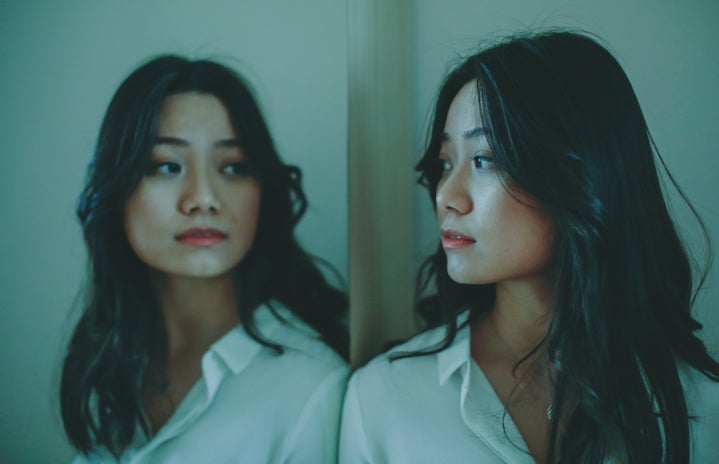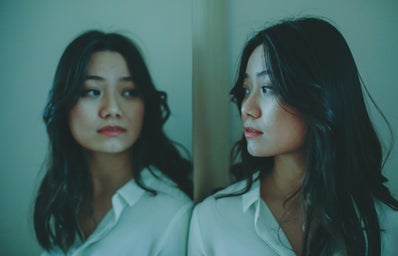“You are a woman with a man inside watching a woman,” – Margaret Atwood
Last month, my creative writing professor gave our class a prompt to write a scene “in which a woman becomes invisible.” While I was writing about my invisible woman, I realized that for many women, there is safety in invisibility and anonymity. Fear of sexual assault and harassment is inherently tied with being aware of someone’s eyes on you, of being noticed by someone with malicious intent. Writing about invisibility in tandem with witnessing online discussion of the male gaze made me think about how invisibility and safety connect. And I wanted to collect some of my thoughts on the subject.
If you’ve been on the feminist side of TikTok at all in the last year, you’ve noticed the rapid increase in hashtags like #malegaze #femalegaze. There are videos talking about men “written by women,” the internalized male gaze, and how to increase the female gaze in television and film. Though the male and female gaze may not be inherently tied to gender or sex, they color how we perceive and treat men and women in every way. It even colors how we treat ourselves. The male gaze is especially prevalent. It pervades all types of media, social interactions, and relationships.
As awareness of the male gaze increased in the past year (mostly thanks to online communities and feminist authors like Margaret Atwood), I noticed friends becoming painfully aware of how we perceive ourselves through the lenses of others. In particular, this internalized male gaze affects the everyday lives of women. It’s incredibly difficult to figure out if we’re dressing for ourselves or someone else. Do we wear short skirts because we like them, or so that the guy behind us in the Starbucks line notices? Is my closet full of oversized t-shirts because I think they’re cute or because I’m wary of men objectifying my body? As women, we are painfully aware of how we perceive ourselves through the lenses of others.
In that vein, it’s near impossible not to dress for the male gaze. Margaret Atwood says that “even pretending you are exempt from the male gaze is playing into it,” an assertion that becomes particularly concrete when every outfit in your closet plays into some type of male fantasy. So how do we escape? A shapeless sweater? Chin-length hair? Somewhere a photo of a woman with that haircut, wearing that sweater, exists in a Cosmopolitan article titled “10 Looks Men Will Die For.”
I quote Atwood because she’s been especially influential in shaping the language we use to talk about these experiences. In her work The Robber Bride, she writes that “you are your own voyeur,” – a famous phrase that has colored discourse on the male gaze ever since. This quote and the passage that it closes have sparked a discussion about the inescapable nature of the internalized male gaze. Even in our attempts to escape the male gaze, “pretending [we’re] unseen” or that we’re “unconscious of the ever-present watcher peering through the keyhole,” we reinforce it.
The little man inside our heads that Atwood imagines is an omnipresent commentary on our bodies, our choices, and our appearance. But it’s a commentary that’s not our own. Rather, it stems from our painful awareness of social beauty standards created by and for men. In our society, creating a worldview not centered around the opinions and validation of men poses an enormous challenge. We are deer in the headlights, trying desperately to turn on our own lamp, to see ourselves in a light that is only our own. But how can we when the portrayal of women in almost all media is created through the male gaze? When there is no language to talk about ourselves in a way that is separate from the male gaze?
Food for Thought: In a stroke of genius or malcontent, one of my friends nicknamed the little man inside her head Steve. (She informs me that Steve has terrible opinions and should really shut up most of the time.) While Steve is truly the worst, perhaps giving a name to the internalized male gaze can take away some of its power and make it easier to reject.
Even though discussion of these experiences has increased exponentially in recent decades, this awareness of the male gaze is not a modern phenomenon. Consider Virginia Woolf’s Mrs. Dalloway, where the main character finds her identity swallowed by her marriage. In depleting her usefulness to the male gaze and in being already married with children, she experiences “the oddest sense of being herself invisible. Unseen. Unknown” (Woolf). This feeling of invisibility when the eye of the male gaze turns from us is as long-lived as the male gaze itself – as long-lived as the objectification and exploitation of the female body. The male gaze itself is not a new idea, but the language we use to describe it is a recent invention in feminist thought.
Thinking about Mrs. Dalloway and writing about a woman who escapes assault through invisibility made me consider all how women strive for invisibility simply for the sake of safety. We put on an extra jacket walking home at night. We avoid eye contact with men who stare (as if looking away renders us hidden) and imagine that invisibility makes us safe. When we are unsure if the eye that gazes at us wants more than we would like to give, we pretend we are unseen. It doesn’t work.
The guy in the coffee shop that won’t stop staring at you, the man on the bus that’s making eye contact with your t-shirt, or even the friend who says “you look so good!” can shove you into the spotlight of the male gaze. When there’s no light to see yourself in which is not objectifying or doesn’t play into male fantasies, it can feel like the only safe place is in the dark.
However, perhaps there’s freedom in the dark, in invisibility. In an Atlantic article, Akiko Busch postulates that as women age -and slowly exit the harsh light of the male gaze)- “they entertain a wider set of choices about when and how they are seen.” Maybe, it’s in anti-youth, anti-thinness, anti-social beauty standards that women can step out of the male gaze. Busch and I agree that it’s more complicated than that. A lack of social capital or desirability should not imply freedom or safety. How can we be simply ourselves, fitting into or rejecting the male gaze merely by chance, and still experience that freedom of unencumbered choice? As a woman, I want to find the route outside the harsh spotlight but that doesn’t force me into the dark. I want to live in a light of my own making.
It’s as though the only way to escape the male gaze is to convince it to turn from us of its own volition, rather than turning it away ourselves. If we convince this disembodied male gaze that we’re not that pretty, that you shouldn’t be interested, that there are surely other, prettier, thinner, younger women out there, will the eye turn from us? And when we try to escape the male gaze with outward actions, like the way we dress or talk or cut our hair, are we trying to divert it onto others?
I’ve personally struggled with feeling caught in the spotlight of the male gaze. After a negative experience with a man in high school, I started putting on a lot of weight. Subconsciously, I felt that by forgoing social beauty standards of thinness, I could protect myself from the dangers that come with male attention. However, we know that sexual assault and harassment have much more to do with the people perpetrating them than with the appearance of the people who experience them.
Still, it’s a really common reaction to change your appearance in hopes of avoiding assault or harassment. It’s the reason we cover up walking home at night – because there’s this myth that women have control over what happens to their bodies. This myth that if we’re modest enough, or careful enough, or if we hide our bodies well enough that we’ll be able to escape sexual violence and harassment gives us an illusion of control. But it’s not true. The responsibility to avoid harassment or assault doesn’t lie with us. But when the stakes are that high, we try anyway. However, if the will to commit those crimes lies solely with the people who commit them, what are we hoping for? That the woman who gets harassed is someone else? That we’re modest enough or smart enough or careful enough that it’s someone else who ends up the victim? Attempting to divert the male gaze might give us a sense of agency, but believing that women have the power to avoid these experiences creeps dangerously close to victim-blaming.
So, how do women escape the male gaze? How do we stop that feeling of being in the spotlight, unsure if the person behind that gaze is complimentary, objectifying, or even violent? At the moment, the online consensus seems to be a collective throwing of hands in the air. In short, we can’t. The breadth of male fantasies makes escaping the male gaze in practice near impossible. And we cannot make choices in true ignorance because of social conditioning and the omnipresence of the male gaze in media. The man peering through the keyhole knows that we see him.
Though we may always have an acute awareness of the male gaze, not allowing it to change our actions might neutralize its power. When the eyes we use to perceive each other are not our own, we cannot escape the male gaze externally. But what about internally? Although an internal rejection of that little man in our heads does not remove him from the premises, it can stop him from altering our actions. The gaze of that burning spotlight, that eye in the dark tower, may never leave us. However, we can still insist upon our own agency. In conclusion, Steve may not be going anywhere anytime soon, but we can still tell him to shut up.


